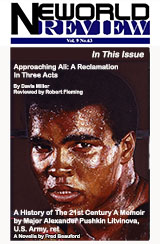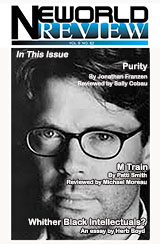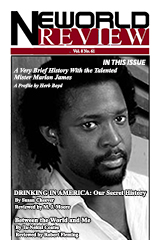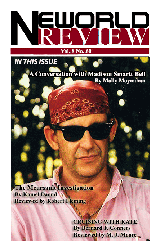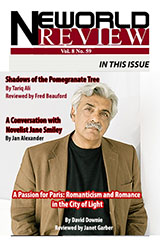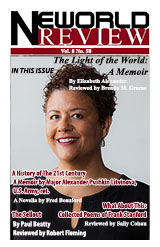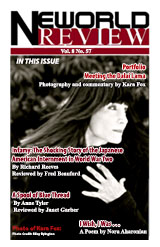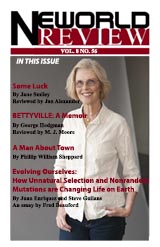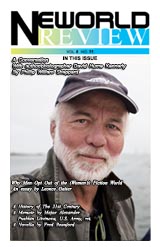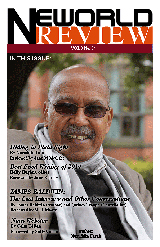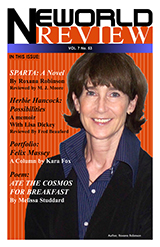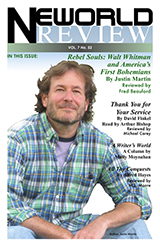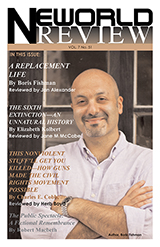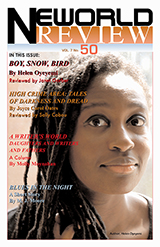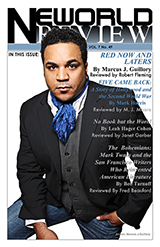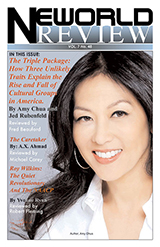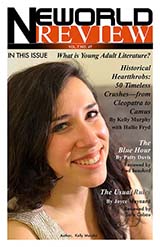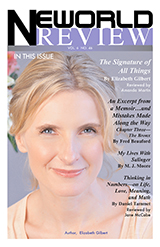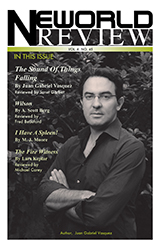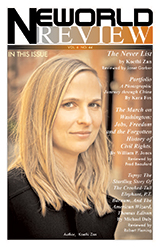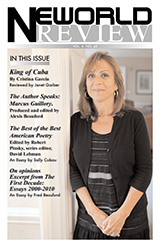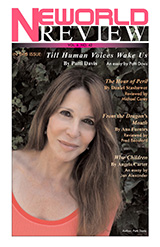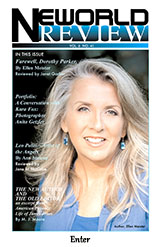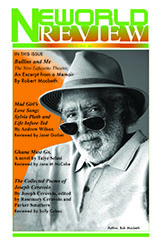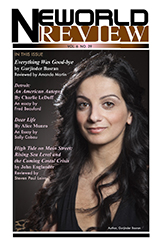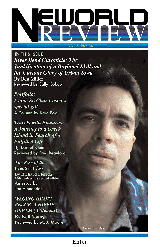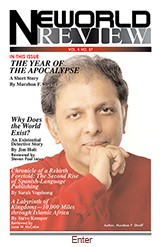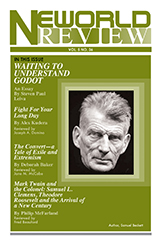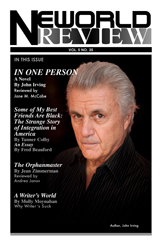Letter to the Reader:
No woe is me, for me
Here is my dilemma, dear reader. As some of you know. I am a novelist/essayist and editor-in-chief/publisher. I am the author of nine novels and two collections of essays. The first printings of four of my novels are selling on the collector’s market for hundreds of dollars each.
***
So what’s the dilemma all about?
I think mainly it's because this is the time of year of writer’s conference, awards dinners and all the rest of the hoopla in the official literary world that reminds me that despite my considerable intellectual accomplishments, and my now worldwide audience, I am still the biggest Joe Nobody in the official literary world in America.
Why?
Age may have something to do with it. I just don’t hang out like my former, Man About Town, self; boasting to everyone I encountered, that what I was producing was the greatest magazine in the world!
So that’s on me.
Also, I call myself an American, and I found that doing such a thing was forbidden, although I am 70 percent Yoruba, 6 percent Native American, 4 percent of the mighty Bush Men of the Kalahari, 1.3 per cent Neanderthal (surprise!, surprise!) and the rest Northern European (German. Danish, and Finland. Again, surprise! surprise! I always thought I was UK).
However, notwithstanding whatever surprises popped up in my DNA test, a birthday gift from my girls, if what I am is not an American, who is?
Lucky for me I am also a scholar who specialize in literary history. Both the Lost Generation and the post World War Two generation felt the harsh censorship of America and fled the country for the fable City of Light.
I am not about to leave for Paris. I am an American. This is still the most interesting place on earth. That’s why I am so glad my Native American ancestors came here in the first place, 20,000 years ago.
Again, not to pull rank, but if that don’t make me an American, what will?
Ponder this issue of Neworld Review.
Fred Beauford
Editor-in-Chief
Publisher
At an out-of-control medical center in NYC, HR manager, Melie, pleads feverishly with buttock-groping doctors and their flaky staff to just get along. But then there's a little murder, a cancer, a handsome devil and his evil parrot, a knife-wielding cook. She's not quitting until she has it all sorted out —the hunk, the macaw, her life work—and neither will you!

This Month's Articles
REVIEWING
The Madwoman Upstairs
By Catherine Lowell
Reviewed by Janet Garber
The Madwoman of Oxford
Back in the days my English Literature professors would chair debates like the ones that occupy the main characters of this novel: how much should what we know about the author’s life influence our reading and interpretation of her books? Is the truth of a book dependent upon the author’s intention, her real life experiences, or the individual reader’s “take” on the subject? Whose vision holds the trump card—the author’s, the critic’s, or the reader’s?
I distinctly remember a majority ruling to the effect that a book had to stand on its own merits, however interesting it might be to trace its origins back to its author’s actual experiences. However…
The Madwoman Upstairs stars the last surviving descendant of the Brontë family, Ms. Samantha Whipple, who is creating quite a stir on the campus of Oxford University where she is enrolled as a student.
Trying to remain under the radar proves futile when her every move is broadcast in the campus newspaper. She meets with her handsome, brooding tutor once a week and engages in obstinate, obstructive, obtuse banter, repeatedly insisting that she hates writing and writers and certainly does not want to talk about the Brontës.
Why is she there? Her eccentric father, whose educational theories echo those of patriarch Patrick Brontë, has died in a mysterious fire. The literary world is ablaze, searching frantically for the rumored caché of valuable Brontë artifacts. Anything will do: Charlotte’s scarf, Emily’s brooch, Anne’s diary.
Meanwhile, Samantha has always been told this caché is a fiction and non-existent. She has inherited nothing so far, but her father’s scribbled, nearly illegible will mentions a bequest of The Warnings of Experience. What is that, and, more critically, where is that? Samantha grudgingly admits she needs help if she’s to unravel the mystery and become an heiress. Who better to guide her in following the trail of her father’s clues than . . .her tutor?
Sticking close to her room in the Tower, interacting minimally with other students, not participating in any activities as far as the reader knows, Samantha lives a life most uncharacteristic of college freshmen. She’s drawn out of her apathy and mourning by the sudden and mysterious materializing of the Brontë novels, the very worn editions owned....Read More
HISTORY
The City of Light and the Making of American Writers
An essay by Fred Beauford
For reasons I cannot fully understand, for the last few years I have become obsessed with reading biographies of 20th Century American writers; madly almost, until book after book finally led me to those writers who came to the conclusion that exile from America was the only way they could ever fully realize their talents as creative writers in a uncharted post war world, first with Ernest Hemingway’s “Lost Generation” and their long, slow journey by sea to the fable City of Light.
Hemingway’s shell-shocked generation was still walking in the bloody footsteps of the most horrendous shedding of human blood by other humans in recorded history; what we call World War One.
It was also clear that The Lost Generation was seeking small, fun filled caves with like-minded souls, to slowly lick their wounds and seek something meaningful other than material things and more warfare.
American writers first discovered Paris as the place to be for artists because of a newspaperman and political activist from New England named Henry Clapp, Jr. In August 1849, Clapp went to Paris to attend a three-day world peace congress, where he found a city that had just experienced a revolution the year before he arrived, and “the boulevards of Paris still thrummed with idealism, slogans and grand artistic schemes. The city’s cafes played host to a thriving scene, known as Bohemianism,” writes Justin Martin in Rebel Souls: Walt Whitman and America’s First Bohemians
After the experience of Paris, and the vibrant artistic atmosphere-- made even more so by the instant sensation on November 22, 1849 of the play La Vie de Boheme, which Puccini later adapted in 1896 for his classic opera, La Boheme—there was no way that Clapp could return to New England. Instead, he moved to New York City, determined to bring to America the Bohemia he had experience in Paris. And bring it he did, and he single-handedly started the mystique of The City of Light in America.
***
It was Gertrude Stein—Paris’s abiding spirit and prominent literary hostess—who coined the phrase “The Lost Generation” in conversation with Ernest Hemingway.
“You are all a lost .....Read More
REVIEWING
If the Oceans Were Ink—an Unlikely Friendship and a Journey to the Heart of the Quran
By Carla Power
Reviewed by Jane M McCabe
After studying theology for three years at Luther Seminary in St. Paul, Minnesota and then studying Islam independently for the next twenty years, in the year 2000 I published a book with Xlibris called Revelation! The Single Story of Divine Prophecy to Abraham and His Descendants—the Jews, Christians, and Muslims.
In it I argued that if one believes in the reality of divine Revelation (as opposed to revelation, spelled with a lower case “r”), that is to say, the times in human history when selected people have received messages from God (as recorded in the Old and New Testaments) then the Prophet Muhammed is either a Prophet within the Judeo-Christian tradition or he is not. And, if he is not, then he is a fraud.
Since this is one of those questions to which an answer cannot be given, I proffered the answer, YES, Muhammed is a Prophet within the Judeo-Christian tradition!
One can view Revelation from the time of Noah and Abraham to Mohammed as a succession of Revelations, each one improving on those which preceded it. The Revelation given to Jesus is an improvement over the Law given to the Israelites in the form of the Ten Commandments, in that Jesus summed up the entire law into two commandments, that we love God with all our heart and soul, and our neighbors as ourselves.
We might think that this would be the end of it, but then, 500 years later, along came Mohammed, in 570 AD to be precise, and to him was given the Revelation that came to be compiled into the Quran. Following this line of reasoning we might view the Quran as Revelation given to correct misconceptions created by the Jews and Christians.
Great are the implication of this, for then it is incumbent that Islam be reconciled with Christianity and Islam!
After having thoroughly studied the Quran and having made note of its Old and New Testament references, I analyzed their differences from comparable Biblical texts.
When recently, 16 years later, I noticed a book called If the Oceans Were Ink on the shelves of Vroman’s Bookstore in Pasadena, it rang a bell. I recognized the verse from the Quran:
“Say, even if the oceans were ink
For (writing) the words of my Lord,
The ocean would be exhausted
Before the words of my Lord ....Read More
BIOGRAPHY
THE OTHER ADELE
by M. J. Moore
A talented, uniquely fated woman died in New York on a Sunday night last November.
Then her obituaries appeared, and the public was again reminded that Adele Morales Mailer was the second wife of author Norman Mailer; also that she was the wife he stabbed nearly to death at the nadir of a drunken bash at their home in November 1960.
But she was more than the second of Mailer's six wives.
Born in 1925 and living on her own in Greenwich Village, by 1950, Adele Morales Mailer was also a serious painter who studied with the best Manhattan instructors in the 1950s (Hans Hofmann, for one).
Later, after marrying Norman Mailer in 1954, she gave birth to two daughters. By all accounts, she was a remarkably devoted mother.
Furthermore, Adele was a studious actress, who in her later years was a perennial member of the esteemed Actors Studio workshop, which is no cakewalk to audition for.
And, she also was a memoirist. Her autobiography, The Last Party (published by Barricade Books in 1997), offers abundant insights into the highs and lows of the mythic, excessively boozy New York scene in the 1950s.
Adele’s chronicle belongs on the same shelf as How I Became Hettie Jones (by Hettie Jones) or Anne Roiphe’s Art and Madness: A Memoir of Lust without Reason..
The Last Party compares favorably with poet Diane di Prima’s Recollections of My Life as a Woman: The New York Years.
What all those gifted women (and their memoirs) have in common....Read More
REVIEWING
Writing My Wrongs—Life, Death, and Redemption in an American Prison
By Shaka Senghor
Reviewed by Herb Boyd
Shaka Senghor’s story of redemption
A couple of generations ago, black male writers were firmly ensconced on the literary roost. Noted authors such as James Baldwin, Ralph Ellison, Richard Wright, Chester Himes, Amiri Baraka (nee LeRoi Jones), Ishmael Reed, and John A. Williams were being reviewed, summoned to the book circuit, and lauded by the award committees.
Then Terry McMillan and notable others—Alice Walker, Toni Morrison, Gloria Naylor, Ntozake Shange, Bebe Moore Campbell, Bell Hooks, et. al.—broke the ice and marked the arrival of a coterie of highly informed, assertive and talented black female writers.
Now comes a fresh wave of younger African-American men, several of them richly-anointed with the top prizes. Leading the way is Ta-Nehisi Coates, a proud recipient of a bundle of awards, none more lucrative than the MacArthur Genius salute.
Hot on his heels is Marlon James, who took home the esteemed Man Booker Prize. Darryl Pinckney, perhaps not as young, and Hilton Als, the New Yorker magazine’s resident guru as well as the redoubtable Stanley Crouch and Paul Beatty among those returning to the plateau of acclaim.
Most of these black men of the pen have commanded media space one way or another, but they better save some room for Shaka Senghor. His book, Writing My Wrongs—Life, Death, and Redemption in an American Prison (Convergent Books, 2016) is gathering considerable praise from a plethora of respected critics. In many ways his book is a cautionary tale in the tradition of The Autobiography of Malcolm X or Nathan McCall’s Makes Me Wanna Holler, or even Claude Brown’s Manchild in the Promised Land, but with substantial more grit, grief, and grist.
It is also a book about Detroit, a city that has endured its share of bad news. Senghor counter balances the terrible press and provides at least a few sprigs of hope and promise.
Senghor’s story of a resident’s emergence from squalor and .....Read More
REVIEWING
Barefoot Dogs
By Antonio Ruiz-Camacho
Reviewed by Michael Carey
Ruiz-Camacho is an educated and gifted writer. His debut story collection, Barefoot Dogs, is receiving a great deal of attention. I have to say, it is well earned, indeed. Born in Mexico and receiving a higher education in the United States, Antonio tackles the subject of a Mexican family ripped at the seams by the kidnapping of its patriarch and the dispersion of its members.
Barefoot Dogs tells eight stories of people connected to the Arteaga family after the disappearance of Jose Victoriano Arteaga. Ruiz-Camacho takes a unique approach to the tragedy in the characters he chooses to explore....Read More
REVIEWING
Book Cover Designs
Edited by Matthew Goodman
Reviewed by Fred Beauford
"When I received an email from Schiffer Publishing, a book publishing company I was not familiar with, I knew immediately that the book they were pitching to me, Book Cover Designs, was one I had to personally review.
I have done much with book covers at Neworld Review, as you well know. I learned years ago, as a print magazine Editor-in-Chief, that print and visual art compliment each other in so many ways.
But now what? What about this brand new online world? This is not the large, wonderful space you have with an 8 1/2 by 11 format, or a “double truck,” as the case may be.
So, how do you marry the best of both worlds?
One day, as I was sitting in my office in New York City (the barstool at The Garage in the Village), I was thinking about all the wonderful books that had started pouring into Neworld Review, my first venture into this new world.
It hit me: those great looking book covers would make better art than author’s photos. Most writers are not noted for their good looks, anyway.
It was clearly an impolite thought on my part about my good, faithful friends, the writers; but nevertheless, I immediately took them off of the home page, and started using the book covers as art; and here we are, almost ten years later, and those great covers certainly did help to put us on the map.
In fact, I spotted at least four of them in Goodman’s book that I have used for art. It was also good to see the faces of the artists that produced those covers.
Matthew Goodman does a great job in his selections, as he looked at the work of countless dozens of book cover designers, both individuals and design companies. In the end, out of this, he selected 51. He also had all of his selections to write a brief reason for their many successes in their field.
Most of Goodman’s selections in Book Cover Designs worked very well as both art and as a selling tool. Because, in the end, and I don’t have to....Read More
A WRITER'S WORLD
A Writer's World
A Column by Molly Moynahan
The Agony and Whatever
I’m starting this column—waiting to hear whether a good publisher, a dream editor, actually, wants my new novel tentatively titled The Heart Wants What It Wants. The title is inspired by Emily Dickinson and, as it turns out, Selena Gomez. I feel like killing myself. I can’t write; I can’t focus; I’m angry, sad and certain that I’m going to get my own heart broken.
Again. I keep choosing parts of the book to reread, and then I think, “Jesus, I suck,” or “Hey, I’m brilliant,” but neither is true, and I’m tired. My husband tries to be supportive but he has no idea what it means to write books and wait and wait and then discover whatever it was you thought you’d managed to accomplish could be dismissed in a sentence: “Not what we’re looking for.” “Ultimately, I remain unmoved.” “Molly has such a unique voice but our list is full.” Yadda, yadda, yadda.
I worked in publishing before I got my MFA, got married, had a baby, moved to London, Dallas, Chicago, got divorced, taught high school, published a novel that garnered lots of attention, made New York Times Notable Book, and then, and then, nothing.
When editors don’t buy your book they are usually telling the truth in their response—“missed the mark, unconvincing, failed to engage,” but, the confusing part is all the positive feedback I received followed the “no.” No, we don’t care that you’ve rewritten this story four times. No.
And yes, it is, no. This morning I received e-mail from the editor telling me the publisher won’t go for it, and so, no. I am slightly stunned, choked with fear, doubt and rage. This diminishes, and I am left with that oh-so-familiar feeling: I don’t think I ....Read More
NOVELLA
A History of The 21st Century
A Memoir By Major Alexander Pushkin Litvinova, U.S. Army, ret.
A Novella by Fred Beauford
Chapter 9
Well, what was next was that tall, dark-skinned, lanky, AME preacher from Columbia, S.C. named Rev. Guess, I told you about.
At first, everybody laughed. I was still following the news then and I watched the shirks of the smart-ass Generation Rule commentators when they discussed Rev. Guess. You had pushy, fearless black Reverends like that back in your day, Father. You even deftly portrayed one in your novel The Woman’s Man. What was his name, the Rev. Alex?
If I was still hanging out in my bars in Manhattan with the gang, I could see us now, pointing at the large thin screen, laughing our hip, sophisticated, knowing laughter.
And me, the Major, the man of action, the mad Russian, would yell above the rest, “Get the fuck outta here!”
But Father, America was a land in deep psychological turmoil and pain. We could still make money better than everyone else. We still made things. Our military was still intact. Our businesses, as usual, made an amazing recovery. We still had more than we could eat. It was just that we didn’t believe in very much.
Rev. Guess had an uncanny, almost supernatural ability to tap into, and probe our psychic pain. It was as if he had been sent from another world. His message was simple: moral decay.
I can see you smiling a thin, wry little smile now, Father. That message is as old as people. So-called religious and political leaders have been beating humans upside the head with that message since the first African grunted!
But this homely looking guy, as he peered into our living rooms, with his dark shining eyes visible behind his small, old-fashioned glasses, just seemed to be saying all of the things most people wanted to hear. He was the most eloquent person I had ever heard in my life.
God, Father, did he ever have a silver tongue! Let me give you an example:
“Did all our great wealth, our unparalleled military might, in the end, protect those millions who died that day? No!
“But what was New York City at the time of the Big Bang? What had it become? What made the All Mighty turn his gracious back on that den of evil? Yes evil, my fellow Americans.
“I don’t want to cast blame on the dead, God rest their unfortunate souls, but the New York of 2037 was a hedonist place that denied all of God’s basic rules. It was a place were there were more bars, more drugs, more men living with men, more women living with women, then men and women living in family, in harmony with nature, as God intended.
“More! More! More! More! More of everything that is wicked and evil in the world! They even had the nerve, the sheer, unmitigated gall, and the audacity to call themselves Generation Rule. Generation Rule? Rule what? Rule whom? Didn’t they know in all of their arrogance, that only God rules? Generation Rule, indeed!”
He phased and stared at us; letting his words sink in, watching us closely through our television screens “And we wonder why, my fellow Americans” he concluded,” that God turned his back on New York!”
This obviously didn’t play well in what was left of New York. But for the rest of the country, Rev. Guess had turned into a national hero. A man of faith. A man of moral values. A man who believed deeply in something other than making a buck and poisoning people!
There was also an interesting sub-text to all of this, although unspoken. Rev. Guess was so attractive because he wasn’t slick, well-package, official, press savvy—all of the things we had come to expect from our leaders of whatever color. Those qualities were now seen as the very things that had lead us down this path of destruction and fear of the future. He was giving plainspoken, hard working, do all the grunt work Americans-- back a future.
What he gave me, Father were the creeps!
It seemed that he was making a direct attack on my friends and me; that somehow we were the ones that were responsible for the blast. I knew many people in the country hated and envied us in New York. We seemed to be....Read More
Neworld Review
Vol. 9 No 64 - 2016
Editor-in-Chief
/Publisher
Fred Beauford
Online Managing Editor
Richard D. O'Brien
Editor-at-Large
Jan Alexander
Associate Editor
Jane M. McCabe
Poetry Editor
Sally Cobau
Senior Editors
Molly Moynahan
Herb Boyd
M. J. Moore
Janet Garber
Director of Photography
Kara Fox
President
Alexis Beauford
Contributing Writers
Michael Carey
Robert Fleming
Steve Fisch: Portfolio
Brenda M. Greene
Robert Macbeth
Emily Rosen
Jane Smiley
Michael Moreau
The Neworld Review is a publication of Fred Beauford, 3183 Wilshire Blvd,
Suite 196,
Los Angeles, CA. 90010.
Material in this publication may not be reproduced in whole or in part without permission. Opinions expressed by contributors do not necessarily reflect the views of the publishers.
Manuscripts should be accompanied by a self-stamped envelope. Online submissions are accepted at [email protected].
Neworld Review cannot be held responsible for unsolicited photographs or manuscripts.
All correspondence to:
Fred Beauford
Editor-in Chief/Publisher
Neworld Review
3183 Wilshire Blvd,
Suite 196,
Los Angeles, CA. 90010
Archived Issues





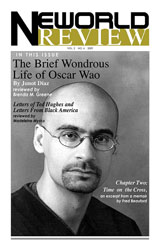
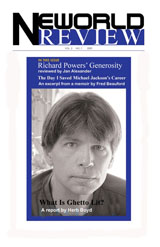

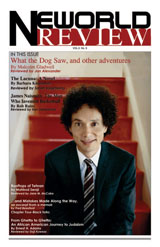
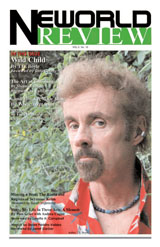
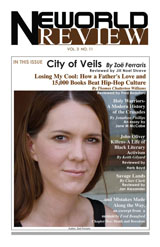
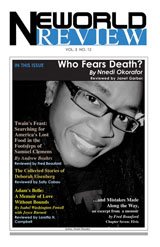
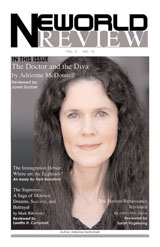
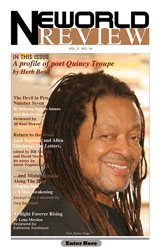
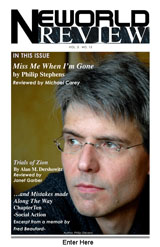
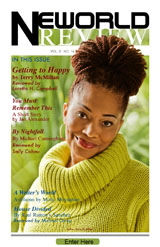
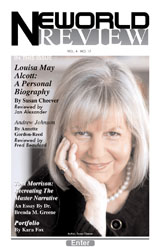
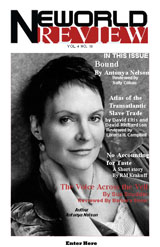
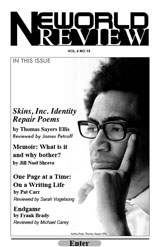
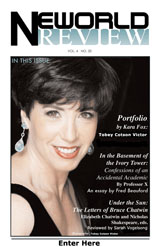
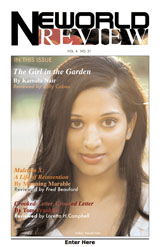
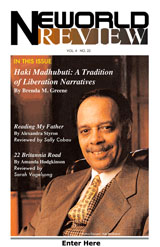
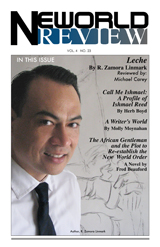
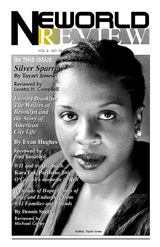
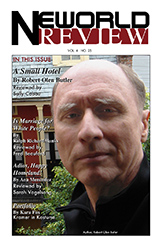
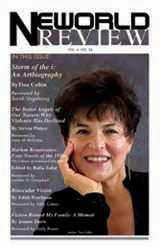
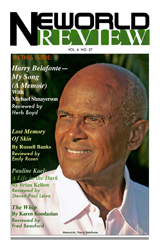
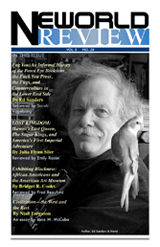
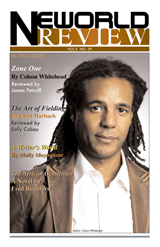
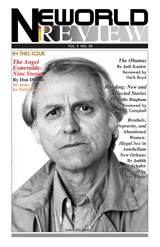
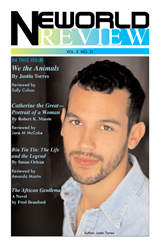
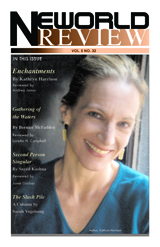
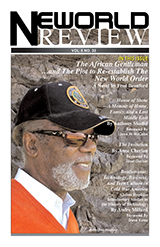
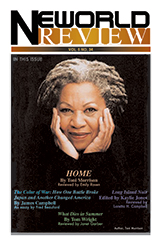
Digital favorites
- Non Gamstop Casinos UK
- Casinos Not On Gamstop
- Mejores Casinos Online
- Siti Casino Non Aams
- Casinos Not On Gamstop
- Gambling Sites Not On Gamstop
- Non Gamstop Casinos
- Online Casinos UK
- Best Non Gamstop Casinos
- Casino En Ligne
- UK Casinos Not On Gamstop
- Best Casino Sites Not On Gamstop 2025
- Best Non Gamstop Casinos
- Mejores Casas Apuestas Online
- Siti Casino Online Non Aams
- Top UK Casino Sites
- Meilleur Casino En Ligne Fiable
- Meilleur Casino En Ligne
- Non Gamstop Casino
- Casinos Not On Gamstop
- Slots Not On Gamstop
- Non Gamstop Casino
- Casinos Not On Gamstop
- Siti Casino Online Non Aams
- Lista Casino Online Non Aams
- Siti Casino
- Meilleur Casino En Ligne En Belgique
- Crypto Bookmaker
- українські онлайн казіно
